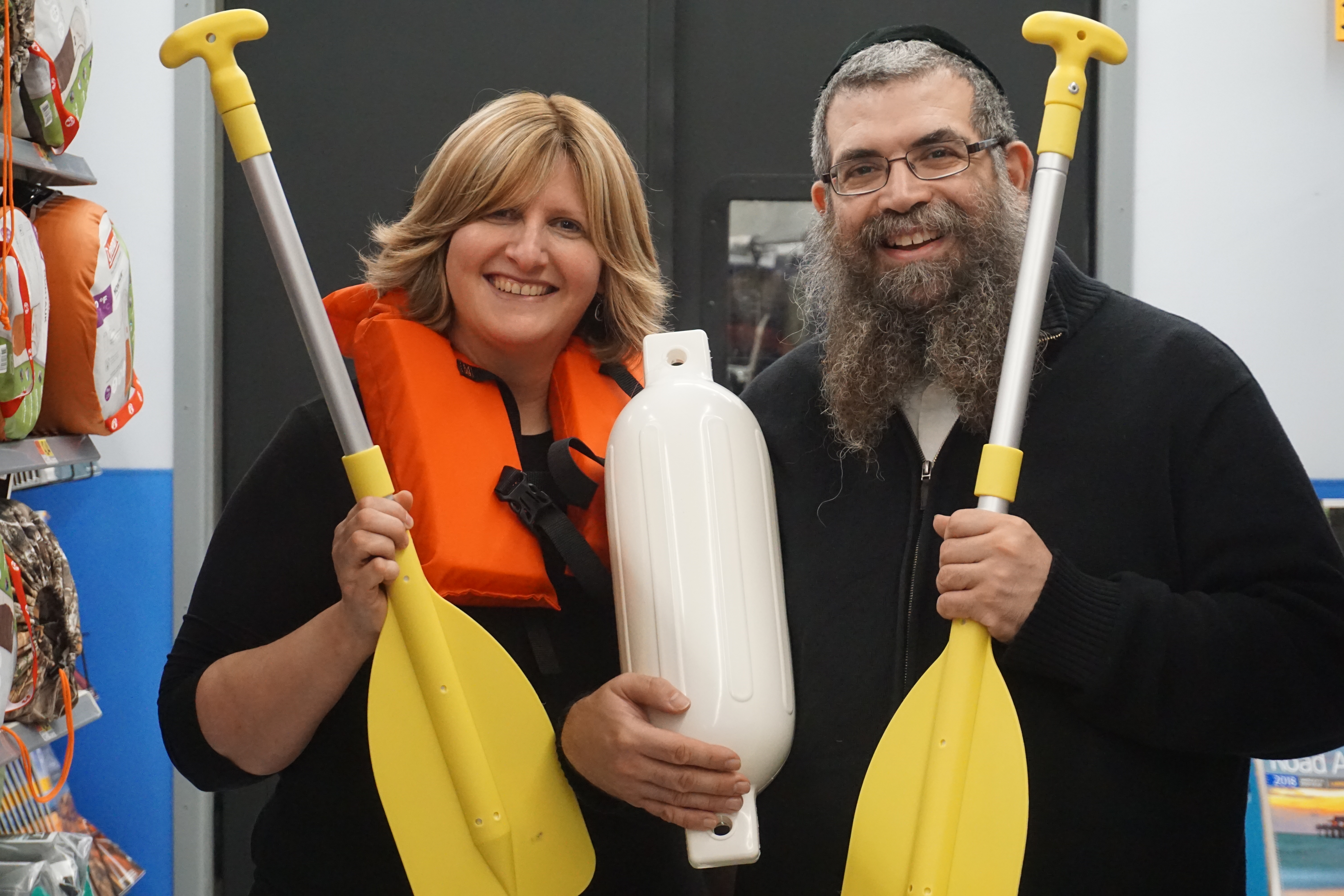 Our Simchat Torah “dancing-rabbi”image had been our profile picture for more than a week after the holiday, and while we wish for the Simchat Torah spirit to linger, we realized it’s time to change our profile picture.
Our Simchat Torah “dancing-rabbi”image had been our profile picture for more than a week after the holiday, and while we wish for the Simchat Torah spirit to linger, we realized it’s time to change our profile picture.
Being that it was already Parshat Noach with its story of the ark and the flood, we thought “Staying Afloat” might be a nice theme for Shabbat – and perhaps for a profile picture, too! Later the same night we went to Wal-Mart and took this picture with the sole remaining post-season life-preserver, two oars and a float.
(1) First of all, we’d like to take this opportunity to thank all Shabbos House supporters:
Parents, alumni, friends all keep Shabbos House afloat financially, so we can pay the bills and do all the work we do. The Shabbos House experience may be priceless (like the old Mastercard ad) and it truly is, but all the events, meals, and activities do cost – and its the ongoing generous support of so many that keeps it afloat. Sometimes we think it might be going underwater, but throughout the year there are always people who step up and contribute in large and small ways and all of it is appreciated and goes a long way. Thanks to you Shabbos House continues to operate without debt, every penny going to make it all happen. Thank you!
(2) Staying afloat can also be an emotional challenge:
Many of us, especially at certain times or in specific situations, can feel pressured or threatened by the raging turbulent “waters” raging all around us. Chassidus speaks of the “Mayim Rabbim” overwhelming turbulent waters. It can be hard to keep swimming, often against the tide, especially for those who may be weakened, feel alone or unsupported.
One of the things we (Raizy and Mendel) spend the most time with outside and in between group events, is taking time to meet with or talk with individuals, in person, on the phone or chat, to try to be as supportive and helpful as possible as students and alumni navigate life’s challenges. Shabbos House endeavors to be a Noah’s Ark (in fact it was once called that back in the 1970’s!) a haven and retreat, a safe space as they call it today, a place where students feel like family, a sense of home.
(3) Staying afloat also has a mystical dimension that we first explored with Matzah-Ball physics:
When it comes to Matzah-Balls most people tend to prefer floaters over sinkers. That’s because floaters are fluffier and sinkers are more dense. Floaters float because their fluffiness indicates empty spaces, porous areas that are filled with air (which is why some use seltzer in making their Matzah Ball mix) which is less dense than water and therefore floats on it. Sinker Matzah-Balls are only tastier if they started off as floaters that eventually filled with richly flavored broth and internalized it, filling its air pockets with soup. But denser sinker Matzah Balls to begin with have little room for anything else, no air pockets, no empty spaces, little room for the soup to filter through and fill it up.
Chassidus speaks a lot about a key word called “Bittul”. There are all kinds of ways to explain this complex word, but one way to see Bittul is as those porous air-pockets in fluffy Matzah-Balls, the openness to receive, to be receptive, to not be all about and dense with only self. It’s a sense of transcendence, or rising beyond ourselves. Truth be told, if we want to stay afloat in life, if we don’t want to drown in the turbulence of life, we need to have more Bittul, we need to be fluffier Matzah Balls. It will keep us afloat!
(4) Archimedes Principle can get a little play here, too.
It’s an ancient law of physics that (along with the issue of density) plays a big role in how boats float. Basically the boat pushes down into the water, displacing the water where it sits, which in turn causes a push-back (or push-up) effect, as the water displaced creates an upward thrust against the boat.
Let’s see Archimedes law in the lens of Jewish identity in a secular world. Imagine that the Jew is the little boat and the deep water all around us is secular life, assimilation into secular life, whatever you want to call it. Some Jews don’t want to take their boats out in water like that. They’d rather not deal with it, it’s too intimidating, too frightening, especially when its surging or turbulent or in strong current. But you are all at college, you are at UAlbany, so your boats are out in the water. Here’s the interesting thing. Sometimes (always in real water, but sometimes in the figurative parable as well) the push-back or push-up from the water is what holds up our boat!
In the extreme the push-back could be experiencing anti-semitism (that would be an extreme example) but could even be the case with a struggle about Jewish holiday observance on campus, or a heated argument about Israel. Sometimes the pushback (while it feels negative) evokes that buoyancy, the uplift that we need. (See Tanya chapters 18, 19). Sometimes the pushback and challenge brings out something deeper and stronger in ourselves, in our identity, in our response, that helps keep our Jewish identity afloat, sailing ahead within a secular world.
